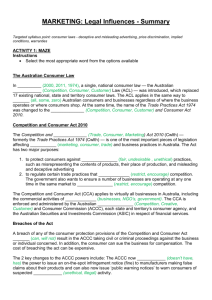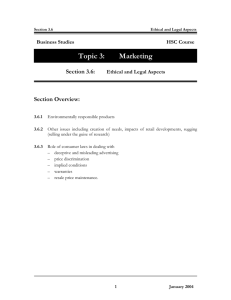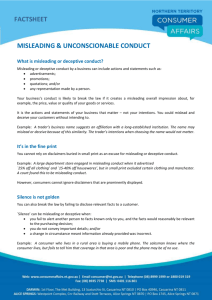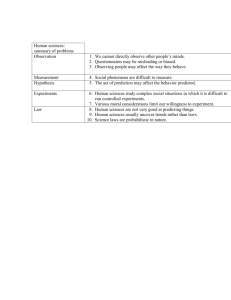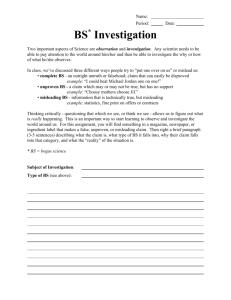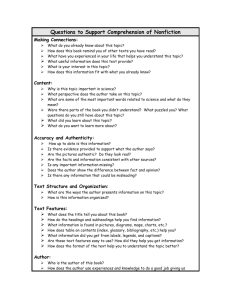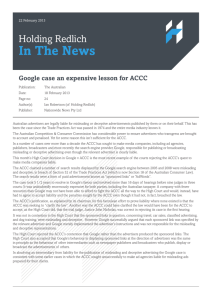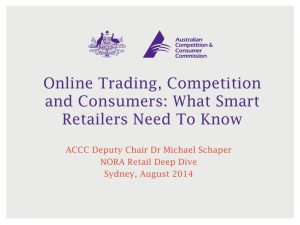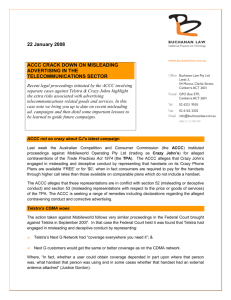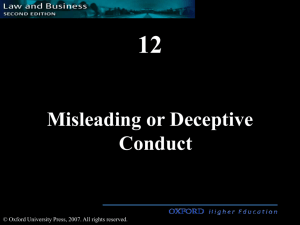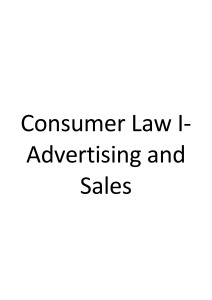ethical_and_legal_aspects
advertisement
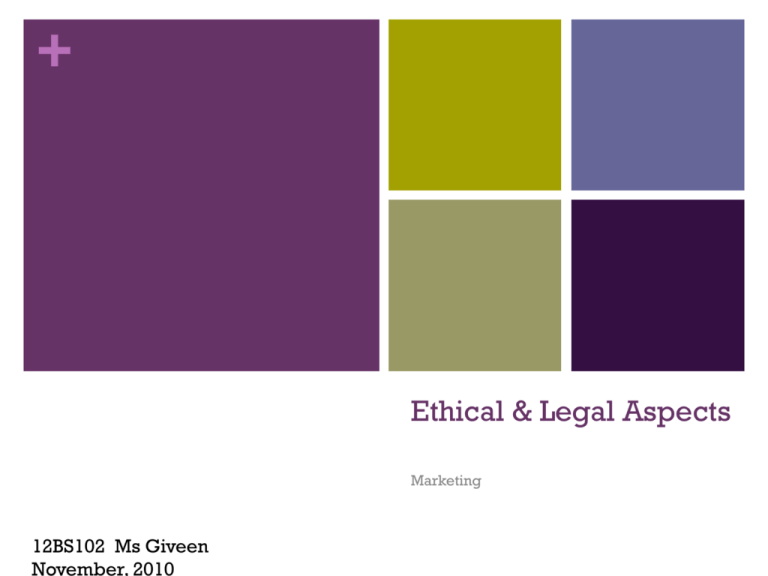
+ Ethical & Legal Aspects Marketing 12BS102 Ms Giveen November, 2010 + Syllabus Outcomes environmentally responsible products other issues including creation of needs, impacts of retail developments, sugging (selling under the guise of research) • role of consumer laws in dealing with – deceptive and misleading advertising – price discrimination – implied conditions – warranties – resale price maintenance. + Environmental Responsibility Marketing Environmentally Responsible Products Environmentally Conscious Design And Manufacturing Product or manufacturing process that, from beginning to end, is in essential harmony with its environment and the associated ecological factors Engineering philosophy that takes environmental aspects of a good's design and life cycle (its progression from production to disposal) into account. Environmental Sustainability Maintaining the factors and practices that contribute to the quality of environment on a long-term basis + Sugging is a market research industry term, meaning "selling under the guise of research". This behavior occurs when a product marketer falsely pretends to be a market researcher conducting a survey, when in reality they are simply trying to sell the product in question Has caused a significant drop in survey participation in past 2 decades as 20-40% of people report being sugged during the “survey” + Consumer Laws Misleading & deceptive conduct No matter how a business communicates with you—whether it is through packaging, advertising, logos, endorsements or sales pitch—you have the right to receive accurate and truthful messages about the goods and services that you buy. Find out what to do if you have been misled or deceived. Unsolicited goods & marketing If you receive unsolicited goods or services, for example something in the mail you did not order, you should take action straight away. The law says that you are not obliged to pay for goods or services that you have not agreed to acquire. + Consumer Laws cont. Selling & marketing directly to consumers Testimonials & endorsements While you should carefully consider offers and promotions, you do not need to assume that all people who knock on your door, ring you up, or send you offers in the mail are out to scam you. There are lots of reputable direct selling and marketing in Australia this type of trading can be convenient for many consumers. Testimonials and endorsements are popular marketing tools used by business to add credibility to their claims about the quality or value of the products or services they are trying to sell you. Businesses may use these methods, provided any representations or claims they make are accurate and truthful. Spam (electronic junk mail) Spam is annoying and it can also be dangerous. While it is nearly impossible to rid yourself of spam completely, there are steps you can take to reduce the amount of spam that you receive and reduce the chances of spam causing you serious problems. + Deceptive and Misleading Advertising Promotional techniques (such as bait and switch pricing) designed to influence buyers with false or misleading claims. Bait and switch pricing = Illegal practice of 'baiting' customers with unrealistically low prices to bring them into the store, and then trying to sell them higher-priced goods on the pretext that the advertised bargain-priced goods are sold out. There is a very broad provision in the Trade Practices Act that prohibits conduct by a corporation that is misleading or deceptive, or would be likely to mislead or deceive you. ACCC governs this type of behaviour www.accc.gov.au + ACCC – Australian Competition & Consumers Commission It makes no difference whether the business intended to mislead or deceive you—it is how the conduct of the business affected your thoughts and beliefs that matters. If the overall impression left by an advertisement, promotion, quotation, statement or other representation made by a business creates a misleading impression in your mind— such as to the price, value or the quality of any goods and services—then the conduct is likely to breach the law. + Price Discrimination Selling the same product to different buyers at different prices depending on order-size lot and/or their geographical location. + Implied Conditions Fundamental condition enforced by courts, even if it is not expressly included in a contract document by the contracting parties. In law, an unwritten requirement (that is deemed important in light of the facts and circumstances of a contract) implies a condition (called condition precedent) of the contract. For example, if a quantity of umbrellas is ordered to be delivered before the rainy season but they arrive only after the season has ended, that order may be cancelable + Warranties Legally binding assurance (which may or may not be in writing) that a good or service is, among other things, (1) fit for use as represented, (2) free from defective material and workmanship, (3) meets statutory and/or other specifications. A warranty describes the conditions under, and period during, which the producer or vendor will: repair, replace, or other compensate for, the defective item without cost to the buyer or user. Often it also delineates the rights and obligations of both parties in case of a claim or dispute + Resale Price Maintenance The term “resale price maintenance” refers to a practice in which suppliers and resellers come to an understanding that places restrictions on the prices that resellers may charge. While there are a number of different types of such agreements, the most common one involves a supplier agreeing with retailers that they will not charge less than a certain price for the supplier’s product. RPM may harm consumers by restricting intra-brand (within brand) price competition, but RPM may also benefit consumers by promoting inter-brand (across brand) competition. Despite these mixed effects, most OECD countries treat RPM as a per se violation of their competition laws

